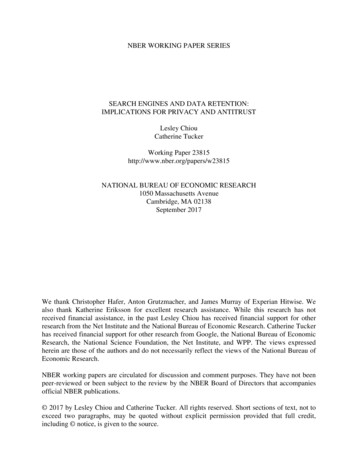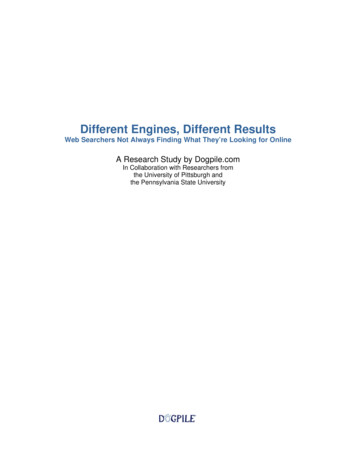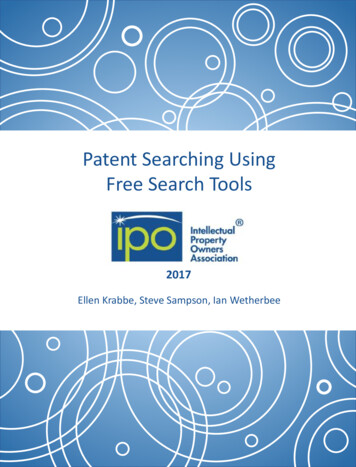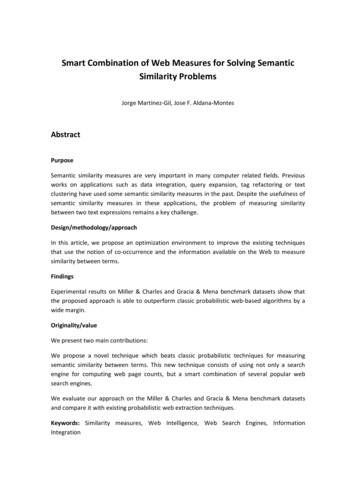
Transcription
NBER WORKING PAPER SERIESSEARCH ENGINES AND DATA RETENTION:IMPLICATIONS FOR PRIVACY AND ANTITRUSTLesley ChiouCatherine TuckerWorking Paper 23815http://www.nber.org/papers/w23815NATIONAL BUREAU OF ECONOMIC RESEARCH1050 Massachusetts AvenueCambridge, MA 02138September 2017We thank Christopher Hafer, Anton Grutzmacher, and James Murray of Experian Hitwise. Wealso thank Katherine Eriksson for excellent research assistance. While this research has notreceived financial assistance, in the past Lesley Chiou has received financial support for otherresearch from the Net Institute and the National Bureau of Economic Research. Catherine Tuckerhas received financial support for other research from Google, the National Bureau of EconomicResearch, the National Science Foundation, the Net Institute, and WPP. The views expressedherein are those of the authors and do not necessarily reflect the views of the National Bureau ofEconomic Research.NBER working papers are circulated for discussion and comment purposes. They have not beenpeer-reviewed or been subject to the review by the NBER Board of Directors that accompaniesofficial NBER publications. 2017 by Lesley Chiou and Catherine Tucker. All rights reserved. Short sections of text, not toexceed two paragraphs, may be quoted without explicit permission provided that full credit,including notice, is given to the source.
Search Engines and Data Retention: Implications for Privacy and AntitrustLesley Chiou and Catherine TuckerNBER Working Paper No. 23815September 2017JEL No. K21,K24,K40ABSTRACTThis paper investigates whether larger quantities of historical data affect a firm's ability tomaintain market share in Internet search. We study whether the length of time that search enginesretained their server logs affected the apparent accuracy of subsequent searches. Our analysisexploits changes in these policies prompted by the actions of policymakers. We find littleempirical evidence that reducing the length of storage of past search engine searches affected theaccuracy of search. Our results suggest that the possession of historical data confers less of anadvantage in market share than is sometimes supposed. Our results also suggest that limits ondata retention may impose fewer costs in instances where overly long data retention leads toprivacy concerns such as an individual's right to be forgotten."Lesley ChiouOccidental College1600 Campus RoadLos Angeles, CA 90041lchiou@oxy.eduCatherine TuckerMIT Sloan School of Management100 Main Street, E62-533Cambridge, MA 02142and NBERcetucker@mit.edu
I.IntroductionCurrently, Internet search attracts legal scrutiny on both sides of the Atlantic (Goldfarb andTucker, 2011a). In this heavily concentrated market, one firm, Google, accounts for 70% ofthe search market in the U.S. and over 90% of the search market in the European Union.1Public and legal controversy surround why and how such dominance in the market may arise.One argument presented in the policy debate is that the ability of search engines to storehistorical data on its users’ searches may confer long-term advantages. These advantagessubsequently allow a dominant search engine to maintain its market share in the long-term.This practice of “data retention” has been quite controversial. Proponents indicate that thestorage of data is necessary to provide high quality searches to users in the future. Criticsallege that any benefits from such “network effects” in search are minimal and are outweighedby a loss in privacy and data security and accompanied by an increase in antitrust concerns.This antitrust debate reflects how data retention is deeply intertwined with legal developments in privacy and data security. At the moment, much privacy regulation focuses onobtaining informed consent, and less emphasis exists over how long data may be stored aftera person’s consent has been acquired. However, the length of time of data storage is keyfor both privacy protection and the security of an individual’s data. Successful attempts atde-anonymizing clickstream or search engine log data have relied on providing a history ortime series of people’s searches or web browsing behavior that did not reveal an identifiablepattern.Despite the policy debate and interest surrounding search engines and data retention, noempirical work exists to date on the effects of data retention on the accuracy or quality ofsearch results. When establishing the legal framework for data retention, policymakers must1Pouros (2010) reports Google’s market share for the five most populous countries in the European Union:United Kingdom (93%), France (96%), Germany (97%), Spain (97%), and Italy (97%). Population measureswere obtained from nationsonline.org, and the list of countries within the European Union is obtained fromthe official European Union website.2
weigh the benefits and costs of data retention to firms, private citizens, and society, so it isimportant to establish first whether and how much benefit exists from the practice of dataretention.We report on the results of our empirical study to measure the benefits that companiesmay receive from having large quantities of data. Specifically, we use variation in guidelinessurrounding the length of time that search engines can store an individual’s data as anexogenous shifter of the amount of data available to a search engine.2 We then study howthe accuracy of search results changes before and after the policy change. We measure theaccuracy of search results by whether the customer navigates to a new website or whetherthe customer had to repeat the search either on that search engine or another search engine.We find no empirical evidence of a negative effect from the reduction of data retentionon the accuracy of search results. Our findings are apparent in the raw data as well as ina regression analysis of panel data with fixed effects to control for changes over time andacross search engines. Our regression analysis suggests not only insignificance but also thatthe likely economic effects of the imprecisely measured coefficients are small.We believe that absence of a decline in the accuracy of searches suggests little long-termadvantage in market share bestowed by longer periods of data retention. Some potentialexplanations exist for the lack of an advantage. First, historic data may be less useful foraccurately predicting current news than is sometimes supposed. Given that recent developments in search have highlighted consumers’ desire for more current and recent news, largeof amounts of historic data may not be useful for relevancy. Second, the precise algorithmsthat underly search engines algorithms are shrouded in secrecy. Third, a substantial fractionof searches are unique: 20% of searches that Google receives each day are searches thatGoogle has not received in the last 90 days (AdWords, 2008). Of course, we also recognize2The term “exogenous” shifter refers to how differences in the length of data retention policies are independent of the outcome of the policy.3
the possibility that our measure of search accuracy may be too direct to pick up nuances inthe precise quality of search results.Our results have implications for the new debate in the legal literature on the right to beforgotten (Rosen, 2012). In the European Union in particular, this “right to be forgotten,”has been gaining increasing traction as a potential foundation of privacy regulation (Bennett,2012)3 . As pointed out by Korenhof et al. (2014) the timing of data retention plays a partin this debate as longer periods of data retention make it difficult for digitally recordedactions to be forgotten. As US policymakers, companies, and consumers keep an eye towardsdevelopments in the EU, concerns exist over whether legal actions abroad could “take overthe American Internet, too” (Dewey, 2015).Part II provides the background for this debate, including context on the existing regulatory landscape, controversies over search data, and the changes in data retention policiesthat we study. Part III describes our study design and methodology and presents our empirical results. Part V discusses our results and their implications. Finally, Part VI concludeswith recommendations for future study.II.A.Background and Institutional SettingExisting Regulatory LandscapeFirms’ policies on data retention are deeply intertwined with broad legal and policy concerns over privacy, security, and antitrust. Privacy laws encompass any policy or legislationthat governs the use and storage of personal information about individuals whether by thegovernment, public, or private entities. As Hetcher (2001) points out, the Internet can oftenlead to a “threat to personal privacy” due to the “ever-expanding flow of personal dataonline.” This notion of privacy and security of personal data has become one of the moresignificant public policy concerns generated by the Internet, leading to “legal and regulatory3See also “Europe’s ‘Right to be Forgotten’ Clashes with U.S. Right to Know,” Forbes, May 16, 2014.4
challenges” (Salbu, 1998).One challenge faced by the US legal system is that currently most privacy laws at thefederal level predate the technologies, such as the Internet, that “raise privacy issues” (Salbu,2014). In recent years, innovations such as behavioral advertising, location-based services,social media, mobile apps, and mobile payments lead to heated debates over an individual’sprivacy and security. The issue is pressing among lawmakers, as the GAO prepared a reportin conjunction with the inquiry by Senator Rockefeller over data collection for marketingpurposes.4 According to Salbu (2014), the report suggests that the “US privacy debate willincreasingly look to international standards and privacy concepts.” For instance, the reportcites the Fair Information Practice Principles as the de facto international standard.Consequently, the need for understanding the effects of data retention on search qualityis a crucial component for the debate. Given that most innovations and regulations occur inthe EU, we study here the effects of changes in those policies abroad and their implicationsfor the US Internet.Our study is related to a privacy concern that began abroad and quickly spread to USpolicy debate: the right to be forgotten. The right to be forgotten “soared into public view”internationally recently when the European Court of Justice “ordered Google to grant aSpanish man’s request to delete search results that linked to 1998 news stories about theman’s unpaid debts” (Roberts, 2015).5 While at present no formal right to make requeststo delete data from the Internet exist in the US, proponents of privacy laws argue that sucha right to be forgotten exists in the US through privacy torts and credit reporting rules.As a result, companies are often left to determine their own policies for the storage anduse of data. Differences in policies across companies may reflect external pressure such ascourt rulings and public sentiment. In our empirical study below, we will use variation in4United States Government Accountability Office, “Information Resellers: Consumer Privacy FrameworkNeeds to Reflect Changes in Technology and the Marketplace,” December 18, 2013.5See Google Spain SL, Google Inc. v. Agencia Espanola de Proteccion de Datos.5
data-retention policies from public pressure by the European Commission.B.Changes in Data Retention PoliciesTable 1 summarizes the variation in data-retention policies that we use in our study. Thefirst two changes in search data retention that we study were prompted by pressure from theEuropean Commission’s data protection advisory group, the Article 29 Working Party. InApril 2008, the group recommended that search engines reduce the time they retained theirdata logs.The first search engine to respond to this challenge was Yahoo!. Yahoo’s Chief TrustOfficer Ann Toth declared that its decision to anonymize its user personal information after90 days “set a new industry standard for protecting consumer privacy. This policy representsYahoo!’s assessment of the minimum amount of time we need to retain data in order torespond to the needs of our business while deepening our trusted relationship with users.”6In January 2010, the chief privacy strategist at Microsoft announced that Microsoft woulddelete the Internet protocol address associated with search queries at six months rather than18 months.7Table 1: Timeline of policy changesDateSearch Engine Change in Storage PolicyDecember 2008 Yahoo!13 to 3 monthsJanuary 2010April 2011Bing18 to 6 monthsYahoo!3 to 18 monthsIn the last example, we study a change in Yahoo! policy where they increased the amountof data they kept. Yahoo claimed that “going back” to 18 months was required in orderto “keep up” in the competitive environment against other search engines. Yahoo! .technet.com/b/microsoft on the h-privacy-with-bing.aspx76
highly personalized services that include shopping recommendation as well as customizednews pages and search tools that “can anticipate what users are looking for.” According toAnne Toth, Chief Trust Officer at Yahoo!, “To pick out patterns for such personalization,Yahoo needs to analyze a larger set of data on user behavior.” Since this change was promptedby internal competitive motivations rather than exogenous changes in the strictness of EUenforcement of the data directive, we use this policy as a robustness check to our mainanalyses.8In sum, our study focuses on changes in the data retention policies. We observe changesin the length of data retention for Yahoo! and Bing. Since Google did not change its dataretention policy, we do not observe changes in Google’s policy.It is also important to highlight that not all de-identification and anonymization procedures were the same. Figure 1 is a representation of Search Engine policies as of February2009 by Microsoft. The figure makes a distinction between de-identification (where the ability to match search queries with other identifying information is removed) and anonymizationwhich involves the removal of IP addresses. In general the policies we studied were targetedtowards anonymization. The policies come in the wake of the release of the AOL searchengine log query data for 658,000 users within the US that demonstrated how a series ofsearch engines queries over time could reveal an individual’s identity. For example, reporterswere able to identify Thelma Arnold, a 62-year-old widow who lives in Lilburn, Georgia asAOL searcher “No. 4417749” from the content of her /09aol.html?pagewanted all& r 07
Figure 1: Microsoft comparison of Search Data Retention Policies of Major Search Enginesin February 2009Source:http: // blogs. technet. com/ b/ microsoft on the issues/ archive/ 2009/ 02/ or-search-engines-before-the-eu. aspx8
III.A.Empirical AnalysisStudy Design and MethodologyOur study design relies on natural experiments to exploit changes in the data-retentionpolicies of major search engines. A natural experiment is a situation in which entities arerandomly exposed to a treatment or control policy.10 In our study, we compare companieswith different policies of the length of data retention due to external pressure from policymakers. The treatment group here is the search engine with the change in the length of dataretention, and the control group consists of search engines with no change in data-retentionpolicies. The idea is that the control group will allow us to control for other seasonal patternsin users’ search behavior that are unrelated to the change in data retention. In this way,we will not attribute spurious factors to the change in data retention. In other words, thecontrol group describes the counterfactual of how we would expect the treatment group tobehave in the absence of the policy change.Given recent changes in data-retention policies at major search engines, this methodologyprovides us with several experiments that we study. We describe the search data that weuse below, and then we report in the raw data as well as regression analysis of the policychanges. Our regression analysis models the outcome variable (a measure of the quality ofsearch) as a function of other explanatory variables.B.Search DataOur analysis relies on data from Experian Hitwise. Hitwise assembles aggregate data usingthe website logs from Internet Service Providers. The information is combined with datafrom opt-in panels to create a geographically diverse sample with usage data from 25 millionpeople worldwide.11 Since we study policy changes that affect search engines in Europe, we1011See The New Palgrave Dictionary of Economics, “natural experiments and quasi-natural experiments.”For further details, Chiou and Tucker (2012) also use this data.9
% clicksGoogleYahoo!BingObservationsTable 2: Summary statisticsMean Std Dev Min Observations2882288228822882Notes: We observe the fraction of traffic to each “downstream” search website from a major search engine.Each observation in our final sample represents a search engine-website-week combination.use data from Hitwise on the search behavior of UK residents.We are interested in whether a change in policies of data retention affected the accuracyof search. As a measure of accuracy, we examine whether a consumer repeats a search ornavigates to a new site. Hitwise reports the top 20 sites that users navigate to after visitinga particular site. We observe the fraction of outgoing traffic to each of these “downstream”sites from each of the major search engines during a given week.We restrict our sample to outgoing traffic from the three major search engines: Yahoo!,Google, and Bing. We identify which downstream sites are search sites by examining sitesthat contain the domain of any major search engine. Our category of search sites excludesmail, book, or wiki sites, which serve a different purpose than general search. We collectdata for the two months before and after each policy change in our sample.Table 2 reports the summary statistics for the downstream search sites in our sample.Each observation in our final sample represents a search engine-website-week combination.For instance, we can observe the percent of outgoing traffic from Yahoo! Search that navigated to a particular search site during the first week of February 2009. The average searchsite received 0.85 percent of all outgoing clicks from a search engine.10
C.Graphical and Regression AnalysisAs a preliminary analysis, we explore the change in traffic to search sites before and aftereach major policy change. Figure 2 summarizes the fraction of traffic to search enginesamong the top 20 downstream sites from Bing and other search engines. The pre- and postperiods refer to the time before and after the Bing’s policy change from 18 to 6 months ofdata retention. As seen in the figure, traffic to search sites remained relatively constant overthis period of time.In Figure 3, we summarize the fraction of traffic to all downstream search sites before andafter Yahoo’s policy change from 13 to 3 months of data retention. Total traffic to searchsites from Yahoo! remained relatively unchanged over this period compared to traffic fromother search engines.11
Figure 2: Downstream search sites visited after Bing and other search engines before andafter Bing reduced its length of data retentionNote: This figure shows the average percentage of visits to “downstream” search websites after users visitedBing and other search engines (Yahoo! and Google) before and after Bing reduced its length of data retentionfrom 18 to 6 months in Juanary 19, 2010.12
Figure 3: Downstream search sites visited after Yahoo! and other search engines before andafter Yahoo! reduced its length of data retentionNote: This figure shows the average percentage of visits to “downstream” search websites after users visitedYahoo! and other search engines (Bing and Google) before and after Yahoo! reduced the length of its dataretention from 13 to 3 months in December 17, 2008.13
The figures suggest that changes in data retention policies did not shift downstream trafficfrom search engines. To formalize the analysis, we run difference-in-differences regressionsat the website level for downstream traffic to the top 20 firms for each of the policy changesin our sample. For instance, to analyze Bing’s policy change, we estimate the percentage ofvisits to website i after visiting search engine j in week t:%visitsijt β0 β1 P ostt Bingj δj αi ρt ijtwhere δ is fixed effect for the originating search engine j, and P ost is an indicator variableequal to 1 for the weeks of Bing’s change in storage policy. The controls α are downstreamwebsite fixed effects, which allow each website to have a specific intercept in the regressionline. The controls ρt are weekly fixed effects to allow each week to have a specific intercept,since variation in the volume and interest of searches may occur across weeks. The coefficientβ1 on the interaction term P ost Bing measures the effect of change in Bing’s storage policyon subsequent visits to search sites with the corresponding change in search sites from trafficoriginating on Yahoo! or Google as a control. We estimate this specification using ordinaryleast squares and cluster our standard errors at the website level to avoid the downward biasreported by Bertrand et al. (2004).To summarize, the regression model describes the relationship between the dependentor outcome variable and a group of explanatory variables. Our coefficient of interest β1measures the extent to which storage policy may increase or decrease subsequent visits tosearch sites. If the coefficient is positive, this suggests that reducing the length of dataretention increased the number of repeat searches on the search engine, i.e., the quality ofsearch results decreased. If the coefficient is negative, this suggests that reducing the lengthof data retention decreased the number of repeat searches on the search engine, i.e., thequality of search results increased.14
Table 3: Downstream traffic to search websites before and afterlength of its data retention from 18 to 6 months in January 2010(1)(2)2 months 4 monthsPost Bing-0.0516-0.0373(0.0405) (0.0978)Website Fixed EffectsYesYesSearch Engine Fixed EffectsYesYesWeek Fixed Bing’s reduction of the(3)6 months-0.0463(0.140)YesYesYes13920.790Notes: Robust standard errors clustered at website level. *p 0.1, **p 0.05, ***p 0.01. The dependentvariable is the percentage of visits to search websites. TheWe test for whether a positive or negative coefficient is statistically significant. As described in Schwartz and Seaman (2013), “statistical significance is the probability that anobserved relationship is not due to chance.”12 If a coefficient is not statistically significant,this means that we cannot reject the hypothesis that the coefficient is equal to zero, i.e., thepolicy had no effect on the outcome variable.We report our results in Table 3 for the specification as described by equation (1). Werun a similar regression analyzing the effect of Yahoo!’s policy change, and we report thoseresults in Table 4. Both tables indicate that the change in storage policy did not have aneffect on downstream visits to search sites. The estimated effect is small and statisticallyinsignificant. To rule out possible delays in implementation, we run our regressions usingvarying windows of 2, 4, and 6 months.12See Getting Started with Statistics Concepts. “A p-value of less than 0.05 is usually considered statistically significant.(“When a result has less than a 5 percent change of having been observed but is observedanyways, it is said to be statistically significant.”) A 5% probability is equal to a p-value of 0.05 or less.Results with a p-value of less than 0.01 are considered highly statistically significant.(a 1% chance “represents a ‘higher’ level of significance because it indicates a less probable outcome and hence a more rigorousstatistical test.”15
Table 4: Downstream traffic to search websites before and after Yahoo!’s reduction of thelength of its data retention from 13 to 3 months in December 2008(1)(2)(3)2 months 4 months 6 monthsPost te Fixed EffectsYesYesYesSearch Engine Fixed EffectsYesYesYesWeek Fixed 80.9040.885Notes: Robust standard errors clustered at website level. *p 0.1, **p 0.05, ***p 0.01. The dependentvariable is the percentage of visits to search websites.16
Table 5: Downstream traffic to search websites before and after Yahoo!’s increase in thelength of its data retention from 3 to 18 months in April 2011(1)(2)(3)2 months 4 months 6 monthsPost e Fixed EffectsYesYesYesSearch Engine Fixed EffectsYesYesYesWeek Fixed 100.9280.933Notes: Robust standard errors clustered at website level. *p 0.1, **p 0.05, ***p 0.01. The dependentvariable is the percentage of visits to search websites.D.Robustness CheckAs a robustness check, we examine a third policy change by Yahoo!, which lengthened thedata retention period from 3 to 18 months. The policy change contrasts with the two policychanges in the prior section, which decreased the length of data retention. Reassuringly, wefind that our results are also statistically insignificant.IV.Discussion and Policy ImplicationsOur findings suggest that long periods of data storage do not confer advantages in searchquality, which is an often-cited benefit of data retention by companies. Of course, a fewcaveats exist. First, our study focuses on blanket policies by firms towards data retentionpolicies and finds little observable effects on search accuracy as measured by the need torepeat searches. However, we do want to highlight that the kind of policies studied in thispaper are very different from the recent cases concerning the right to be forgotten in theEuropean Union which have focused on the individual rather than blanket data retentionpolicies.1313For instance, in an ECJ case, a Spanish man requested to have details of his foreclosure deletedfrom Google. Google Spain SL, Google Inc. v Agencia Espanola de Proteccion de Datos. Accessed at17
Furthermore, our finding of little effect of longer periods of data retention contrasts withother work that has found significant costs from different types of privacy regulation oncommercial outcomes (Miller and Tucker, 2009; Goldfarb and Tucker, 2011b, 2012). Werecognize that the difference may reflect the importance of data recency and current resultsto the search engine business model.Our findings also suggest important policy implications. Unlike the EU, the US does nothave a “single overarching privacy law.”14 If long periods of data retention do not generatehigher quality of searches, this suggests that the costs of privacy laws for users and companiesmay be lower than otherwise presumed. The debate thus far has centered on whether moreprivacy is worth the cost. Our results suggest that the costs of privacy may be lower thancurrently perceived.Privacy concepts differ between the US and other legal regimes in the EU (Laux, 2007).In the EU, the user owns a “set of legal rights entitling him to control data that are describinghim, regardless of who had access to the data.” In the US, whoever has rightfull access tothe data “owns” the data. While our results do not necessarily suggest that privacy conceptsin the US need to change, our results suggest that other policy innovations such as consentuse may be useful. In the EU, a consent requirement allows a user to prevent any use of thedata that he or she does not agree to. This notion is similar to intellectual property rights,e.g., Copyright, Patent, and Trademark rights. Alternatively, policymakers may choose toadopt blanket policies that directly govern the length of data retention.In addition, our empirical results contribute to the antitrust debate over search enginedominance. We do not find evidence of an advantage in search quality for search enginesthat adopt longer periods of data retention. This suggests that a dominant search enginewith a large fraction of market share does not necessarily maintain its dominance in the ation/pdf/2014-05/cp140070en.pdf.14“Differences between the privacy laws in the EU and the US”, Management, Compliance, & Auditing,January 10, 2013.18
term due to its access of historical data on users. Of course, we do not rule out that otherantitrust concerns may exist as to why market concentration remains so high in Internetsearch markets.V.Conclusion and Recommendations for Future StudyThis paper investigates whether retention of large sets of data by firms that offer Internetsearch provide measurable changes to their performance from the perspective of consumers.Specifically, we study how the length of time that search engines retained their server logsaffected the apparent accuracy of subsequent searches. Our analysis exploits changes in thesepolicies prompted by the actions of the European Commission. We find little empiricalevidence that reducing the length of storage of past search engine searches affected theaccuracy of search. Our results suggest that the possession of historical data confe
1Pouros (2010) reports Google's market share for the ve most populous countries in the European Union: United Kingdom (93%), France (96%), Germany (97%), Spain (97%), and Italy (97%). Population measures were obtained from nationsonline.org, and the list of countries within the European Union is obtained from the o cial European Union website. 2











